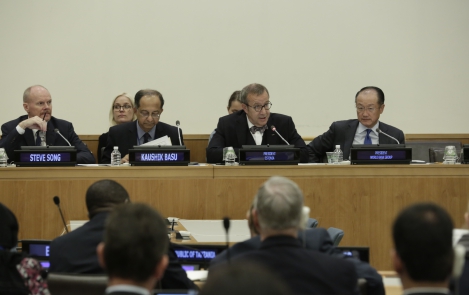-
Reset
+

Development in the digital age
27.09.2015
President Toomas Hendrik Ilves opening the United Nations high-level discussion on digital matters, 27 September 2015 in the United Nations Headquarters, New York.
Excellencies,
Distinguished members of delegations,
Ladies and Gentlemen,
Half of the world population has access to the Internet. Two thirds of the people use mobile phones, there are more mobile subscriptions than there are humans on the globe. We live in a digital age. Hence today's topic: Development in the Digital Age. By placing the potential of digital technologies at the center of the development agenda we recognize the obvious: in order to meet the sustainable development goals, we need to take advantage of the ever closer connected world.
The World Bank's forthcoming World Development Report 2016 is titled Digital Dividends. It will be launched in January 2016, and we fully expect that it will provide a useful framework and guidance in harnessing the potential of Internet for development. As a co-chair of this emerging report, I am particularly glad that Mr. Basu from the World Bank, the other co-chair, is here today to contribute to our discussion, together with President Kikwete, President Kim and other speakers.
I can personally testify to the opportunities that information and communication technology can provide for development. Estonia is one of the few countries closest to truly becoming a digital society - the use of technology and digital services is wide-spread in the public as well as in the private sector. Estonians have access to hundreds of electronic services. We can set up a new company and have it legal and running within 20 minutes. 95% of Estonians declare their income online, because it takes less than five minutes and no accountants. All this brings tax administration costs down to only 0.3% of net tax revenues, and saves each citizen an average of 5.4 work days a year.
How did we get there? When we established our independence in 1991 we were a country in transition with per capita income close to poverty level and rather limited resources.
However, we realized that from the point of view of global digital development, we were on an equal footing to developed countries. Let us recall that it was only in the beginning of 1990s when the Internet became publicly available at the global level and computers were adopted in all areas. The conscious policy choice of the Estonian government was to promote the use of digital technologies in all spheres of society and economy. After all, the Internet and digital technologies can be essential drivers for economic growth and equity, if used properly. Not to mention the efficiency of public service delivery: our researchers argue that efficiency gains from online services can amount to as high as 2% of GDP per year.
We have also learned that if we want the digital dividends to become available for a country, its citizens and consumers, solid public policies are required. The technology itself is not sufficient to solve development problems, but it will only become effective if combined with other reforms.
What do I mean by this? In Estonia, legal and administrative reforms are the foundations of our digital development. For example, we adopted a law on digital signature having equal legal value as a handwritten one. Digital signature - 240M since 2002 - is widely used by Estonian governmental offices and private practices. To remind you - the population of Estonia is 1.3M.
Last but not least, development in the digital age implies that people acquire modern skills to utilize the technology. To encourage greater digital adoption, countries will have to go beyond the agenda of making the Internet universally accessible. They also need to simultaneously strengthen necessary skills for all. Education systems play highly important role in this. Based on Estonia's positive example, teaching technical skills like coding early promotes ICT literacy and influences career choices. But even more importantly – instead of pushing to become ICT producers, smaller and developing economies should strive to become avid ICT users.
In short, Estonia reached a high level of human capital, effective business climate and a transparent governance. We have learned that the smart use of the Internet and digital technologies can be essential drivers for economic growth and human development. The key to our success has been a consistency in implementing public and private policies that take advantage of digital technologies.
To conclude, Estonia is ready to cooperate with other countries where our experience and knowledge is needed and has an added value. We have already done this with the number of countries. We have a good cooperation with governments such as Tunisia and Moldova that have embraced Estonian technological solutions, while adjusting them to the local environment.
Ladies and Gentlemen. As I said at the beginning, I believe in the opportunities that ICT can provide for development. Connectivity is the first step on a long road that may lead to increased prosperity. In that context I am pleased to announce that Estonia will join the USA in its new diplomatic initiative "Global Connect", which aims to bring 1.5 billion people online by 2020.


